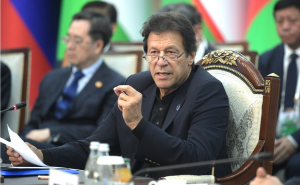An Islamabad court Tuesday summoned former Prime Minister Imran Khan to appear next week to answer contempt charges over his verbal threats to a judge at a weekend rally. Police meanwhile registered another case against him on charges of defying a ban on rallies in Islamabad.
The latest development indicated that Pakistan’s government is stepping up pressure on Khan, who has been holding mass rallies, seeking to return to power. Separately, police raided overnight the apartment of Khan’s close aide Shahbaz Gill in the Pakistani capital, and took him away in handcuffs for interrogation.
A conviction against Khan, who is to appear before the Islamabad High Court on August 31, would mean disqualification from politics for life since under Pakistani law, no convicted person can run for office.
It is the second time that Khan — a former cricket star turned Islamist politician — faces contempt charges. After elections in 1993, he was summoned but pardoned by the Supreme Court after describing the conduct of the judiciary as “shameful” and saying it did not ensure free and fair elections.
Fawad Chaudhry, a senior leader from Khan’s opposition Tehreek-e-Insaf party, told The Associated Press that Khan’s team would examine the summons but that in their opinion, the Islamabad High Court lacks the authority to try Khan for contempt of court.
Legal experts say Khan has limited options and could avoid a conviction if he apologizes for his remarks against Judge Zeba Chaudhry on Saturday, when he told her to “get ready for it, we will also take action against you.”
Also on Tuesday, Islamabad police registered another case against Khan and 16 other leaders from his party on charges of defying a ban on disruptive rallies in Islamabad on Saturday.
The latest developments came two days after authorities filed terrorism charges against Khan, escalating political tensions in the country.
In New York, meanwhile, U.N. spokesman Stephane Dujarric told reporters that U.N. Secretary-General Antonio Guterres was aware of the terrorism charges against Khan and that he “urges calm, lowering of tensions and respect for the rule of law, human rights and fundamental freedoms” in Pakistan.
Khan, who came into power in 2018 and was ousted in April in a no-confidence vote in Parliament, could face from several months to 14 years in prison, the equivalent of a life sentence, on the terrorism charges.
Gill, Khan’s close aide taken Tuesday for interrogation, has been charged with treason for his recent anti-army remarks during a show on the private ARY TV in which he urged soldiers and officers to disobey “illegal” orders from military leaders. The charge carries the death penalty under a sedition act that stems from a British colonial-era law. ARY TV remains off-air in Pakistan following that broadcast.
Since his ouster, Khan has alleged — without providing evidence — that Pakistan’s powerful military took part in a U.S. plot to oust him. Washington, the Pakistani military, and the government of Khan’s successor, Shahbaz Sharif, have all denied the allegation.
Sharif’s government is unhappy with Khan over his threats and although courts usually pardon offenders if they apologize, some politicians have been convicted in the past for disobeying or insulting judges.
Ahsan Bhoon, a lawyer who heads the Supreme Court Bar Association of Pakistan, welcomed the proceedings against Khan, saying no one should be allowed to insult a judge or damage the reputation of the judiciary.
Khan came to power promising to break the pattern of family rule in Pakistan. His opponents contend he was elected with help from the powerful military, which has ruled the country for half of its 75-year history.
Since his ouster, Khan has also demanded early elections and vowed to oust Sharif’s government through “pressure from the people.”

































